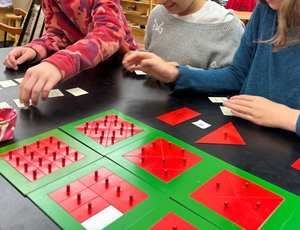The Montessori Prepared Environment

In Montessori, we talk a lot about the “prepared environment.” Really, though, this concept of a prepared environment isn’t limited to Montessori. In fact, from the earth’s biosphere offering an array of support for life, to the fragrant and colorful flowers existing to lure pollinators, to a woman’s uterus preparing each month for the implantation of a fertilized egg – prepared environments are all around us!
A prepared environment has three essential purposes:
- to offer protection,
- to provide nourishment, and
- to stimulate growth.
In Montessori, a prepared environment is a place for children that is specially designed to appeal to their sensitive periods for learning, as well as their fundamental human tendencies. When designing these prepared spaces for children, we take into consideration how to ensure children feel protected and nourished, so they can reach their potential. Basically, the Montessori prepared environment is a place where children can feel at home as they develop their inner selves and outer skills.
One of the ways we offer children safe, home-like learning environments, is through our attentiveness to how the physical space is set up to meet children’s developmental needs. The classrooms have small, easy-to-move tables and chairs, as well as plenty of windows that let in bright, inviting light. Large open floor space allows children to work on the floor on rugs and move freely about the classroom. Low, open shelves display orderly arrangements of beautiful materials which invite children to engage with an array of learning activities.
The materials on the shelves are quite aesthetically appealing and have been developed out of trial and observation in schools all over the world. The beauty of the materials and the classroom appeals to children’s development of an aesthetic sense, while the arrangement of materials from concrete to abstract provides children with a solid sense of order.
In addition to being beautiful, the materials in the environment are real and purposeful. Containers for items even offer different textures and sensorial experiences. Because the materials are authentic, they offer children clear guidelines regarding use and misuse. Fragile items help children learn how to handle items with control and care. Plus, having access to beautiful, breakable treasures conveys an essential message of goodwill and trust.
In the beginning, adults assist children in getting their bearings in the classroom and teach the precise use of each material. The children then have the freedom to choose what they do and to focus for long periods of time.
Although adults are not the focal point in Montessori classrooms, adults are of prime importance. While they may have an outward appearance of passivity, the adults are acutely alert to what is happening in the classroom community. In addition to this presence and awareness, adults in Montessori classrooms must prepare themselves in profound ways. They have extensive intellectual and practical training to be able to link children with different aspects of the learning environment as well as with the breadth and depth of educational materials. Because the adults model how to have a peaceful environment where everyone is respected and able to work without distraction, they also must prepare themselves on a personal and spiritual level.
In addition to this psychological safety, Montessori prepared environments also focus on the importance and value of living things and outdoor spaces so children can keep and develop their connection to nature. Ideally, the classroom includes a garden area in which children can sow seeds, care for living things, and participate in harvesting the fruits of their work. The indoor and outdoor spaces often blend together with plants and animals as integral aspects of the classroom. In Montessori, we consider this connection to nature to be an essential part of education.
The connection to nature both in and out of doors, the arrangement of open space with child-sized furniture, the ordered and aesthetic materials, and the centrality of children with adults offering background support, all provide children with the protection and nourishment they need to develop independence and active engagement.
Children in Montessori prepared environments love their learning spaces! Come visit our school to see how the classrooms appeal to children on so many levels as they engage with their community and construct their understanding of the world.






